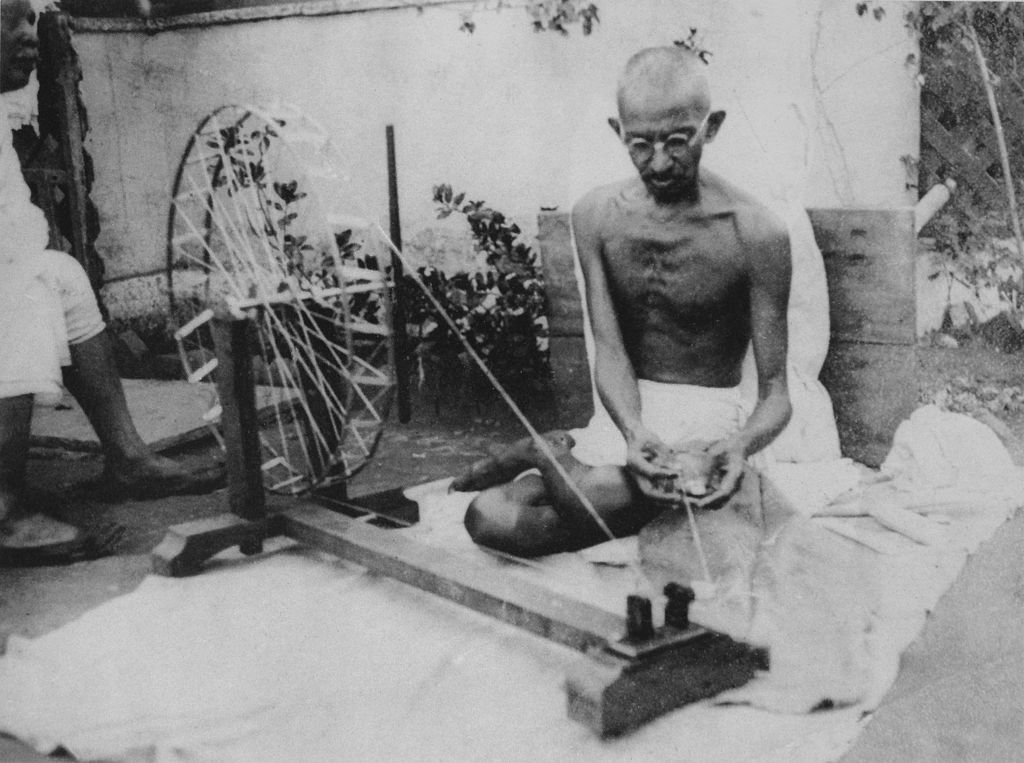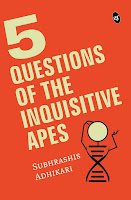Part 2: The Beginning
Part 3: The Cult of Chakra
Part 4: The Practical Man
Part 5: The Sex Maniac
Part 6: The Miracle
Part 7: Decoding Gandhi
‘It has been my experience that I am always true from my point of view, but am often wrong from the point of view of my honest critics. I know that we are both right from our respective points of view. And this knowledge saves me from attributing motives to my opponents or critics. The seven blind men who gave seven different descriptions of the elephant were all right from their respective points of view, and wrong from the point of view of one another, and right and wrong from the point of view of the man who knew the elephant. I very much like this doctrine of the manyness of reality. It is this doctrine that has taught me to judge a Mussalman from his own standpoint and a Christian from his. Formerly I used to resent the ignorance of my opponents. Today I can love them because I am gifted with the eye to see myself as others see them and vice-versa.’ - Gandhi
One needs good IQ to justify criticising Gandhi, and a good EQ to love him. Legends like Tagore and Netaji had both. While they differed in their opinion, Tagore named him ‘Mahatma’ and Netaji addressed him as ‘The Father of the Nation’. It is only people who are both low in EQ and IQ, who can truly hate Gandhi. Gandhi once said to his confused followers,
‘My language is aphoristic, it lacks precision. It is, therefore, open to several interpretation’.His words and actions are not always easy to understand. That’s the reason some people thought that he was too religious Hindu, while others thought he was anti-Hindu. Some considered him a lover of Dalits, while others thought that he was their enemy. He was indeed a riddle to many. For some Britishers like Churchill he was also a pain. Churchill mocked Gandhi as the Half Naked Fakir for the dress he wore and expressed his disappointment as Gandhi did not die in the hunger-strike. Gandhi wrote to Churchill in a letter dated 17th July 1944,
‘ I have long been trying to be a fakir and that naked - a more difficult task. I, therefore, regard the expression as a compliment though unintended’.
Gandhi had a brilliant sense of humour. He once met King George V in London wearing his usual attire. He was later asked what the king said about his attire. Gandhi replied ‘What could he say. He was wearing enough for the two of us.’ Another time someone asked what he thought about Western Civilisation, and his witty response was, ‘It is a good idea’. Without humour Gandhi would not have been able to survive the struggle. He himself confessed, ‘If I had no sense of humour, I would long ago have committed suicide.’
Alongside humour, he was also a very serious man whose strict principles could be hard to live by. There were eleven vows which were considered almost mandatory for those living in his ashram. They were: Truth (Satya), Non-Violence (Ahimsa), Chastity (Brahmacharya), Non-stealing (Asteya), Non-Possession (Aparigraha), Labour (Sharirashtrama), Control of Palate (Asvada), Fearlessness (Abhaya), Respect for all religion (Sarva-Dharma-Samanatva), Only use indigenous products (Swadeshi), and Removal of untouchability (Asprishyata Navaran). The strict principles led to friction between Gandhi and his son Harilal. He once confessed that his greatest regret was his inability to convince two people: Jinnah and Harilal. As a young man Harilal was deeply involved in the freedom movement. Between 1908 and 1911 he has been arrested 6 times. This earned him the nickname ‘Chotte (Little) Gandhi’. When he was 23 years old, he wanted to go to England for higher education and become a barrister. Gandhi himself had to fight against many to go overseas. The irony was that Gandhi was now against it. He did not want his son to get spoilt by Western education. Unfortunately, his opposition became the reason why his son got spoilt. In 1911 Harilal revolted against his father and renounced all family ties. He had problems with his wife, abandoned his children, became an alcoholic and gambler. Harlal started trading imported British clothes when his father urged the nation to boycott foreign goods. Even that business collapsed. Gandhi tried to make a saint out of his children and set example to the nation. He himself evolved over time, but Harilal was not given the time to mature. He broke under pressure. People must have always compared him to his celebrity father and reminded him what a failure he was. That would have left a deep psychological scar in his mind. In a letter Gandhi even accused Harilal of raping his own daughter. He wrote,
‘Manu is telling me number of dangerous things about you. She says that you had raped her even before she was eight years and she was so much hurt that medical treatment was also to be taken’.The Father of Nation failed as a father.
After his death media and politicians left no stone unturned to turn Gandhi into a saint. Richard Attenborough’s 1982 epic film took it to a new level. With such a pure image any imperfections became easily visible. Quite naturally Gandhi’s critics, like G. B. Singh and Dr. Tim Watson, started screaming to prove how bad a person he was. Time has made Gandhi more human. Gandhi was not a saint. He was an ordinary man who was put through extraordinary situations. Facing injustice from a powerful force, he did not accept it like most men—he revolted. Sometimes he was right and at times wrong. He was orthodox, discriminating towards the blacks, he was too religious, he was strict with his children, and he had flaws—like we all do. But what makes him different was that he stood for what he thought was right. He followed his heart and was not afraid to correct himself when he knew he was wrong. He did change his views about Africans, his religious beliefs evolved, and he constantly improved himself. He was a shy person who was afraid to speak in public but had the magnetic personality to attract millions of followers.
There were thousands, and sometimes millions, of followers who came to watch Gandhi. They would thought and chant his name at the sight of him. Thats how much people loved him. But the moment he would rise his finger there would be pin drop silence. Thats how much people respected him. Only because of Gandhi, the freedom movement reached the poor and illiterate mass instead of being a monopoly of few foreign-educated lawyers. He brought in a new method of satyagrahya that taught the world about nonviolent protest. It is for these reasons that he is, and will remain, one of the greatest heroes of the world. To understand Gandhi we must follow what the man himself said,
‘See me please in the nakedness of my working, and in my limitation, you will then know me.’
Back to the Beginning
References:
Also Check Out: 5 Questions of the Inquisitive Apes
- http://indpaedia.com/ind/index.php/Mridula_Gandhi#.E2.80.9CI_requested_Bapu_to_allow_me_to_sleep_separately.E2.80.9D
- https://www.indiatoday.in/magazine/cover-story/story/20130617-mahatma-gandhi-experiment-sexuality-manuben-discovered-diaries-763997-1999-11-30
- https://www.independent.co.uk/arts-entertainment/books/features/thrill-of-the-chaste-the-truth-about-gandhis-sex-life-1937411.html
- https://www.theguardian.com/commentisfree/2018/oct/01/gandhi-celibacy-test-naked-women
- https://www.bbc.com/news/world-asia-india-45469129
- http://www.gandhi-manibhavan.org/activities/essay_elevenvows.htm
- https://www.dailymail.co.uk/news/article-1264952/A-new-book-reveals-Gandhi-tortured-young-women-worshipped-shared-bed.html
- https://www.outlookindia.com/newswire/story/gandhi-the-man-with-a-great-sense-of-humour/862449
- http://www.gandhi-manibhavan.org/activities/essay_elevenvows.htm
- https://www.theguardian.com/film/2007/aug/10/india
- https://en.wikipedia.org/wiki/Harilal_Gandhi
- https://www.ndtv.com/india-news/mahatma-gandhis-letter-accusing-son-of-raping-his-own-daughter-up-for-auction-in-uk-562069
- https://www.amazon.in/My-experiments-truth-M-Gandhi/dp/9387585204/ref=pd_sbs_14_t_0/260-3639262-6869921?_encoding=UTF8&pd_rd_i=9387585204&pd_rd_r=0d8cd17a-f987-4ec5-b9b0-525309023c06&pd_rd_w=f604U&pd_rd_wg=gzvz9&pf_rd_p=21bbdc4d-873b-48c5-a88a-70e643377944&pf_rd_r=AAQ1BZ6DZ5G5QH5EEW3Y&psc=1&refRID=AAQ1BZ6DZ5G5QH5EEW3Y
- https://www.mkgandhi.org/bapumymother/bapumymother.htm
- https://www.mkgandhi.org/ebks/an_atheist.pdf
Also Check Out: 5 Questions of the Inquisitive Apes
Written by Subhrashis Adhikari
"Engaging and entertaining, this page-turner is remarkable in its narration and will give you a new perspective on various aspects of life. Wellresearched and heartfelt, the encouraging tone throughout the book tries to motivate towards a happier life." - Times of India
Link:



































